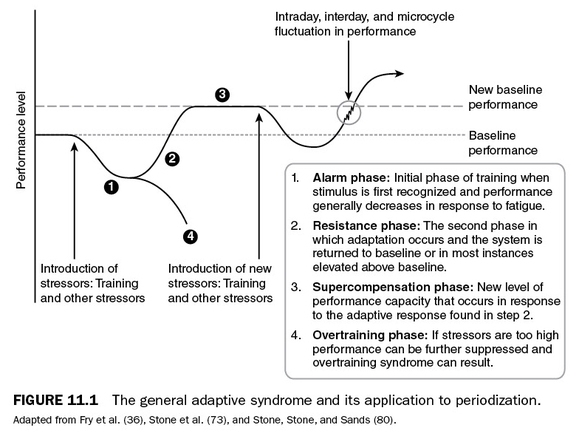Dealing with the Downcycle
Remember the excitement and anticipation you felt when you signed up for that fall half marathon?
It's gonna be awesome! I'm gonna check this one off my bucket list! I'm gonna knock my PR into a whole new zip code!
All that enthusiasm is now mired in the trial of miles. The pamphlet didn't say anything about all this work. It mentioned the fun and swag and expo and medals—but not the humidity, soreness, chafing, and early mornings. As you go through the training for a race, you often lose sight of why you signed up and start to view training as drudgery you must endure.
Many of you are in the phase of training in which the honeymoon is definitely over. The miles are mounting as quickly as the list of questions and concerns. Know that this is okay and normal. The whole point of training is to stress and adapt. (See the graphic below.)

As you stress your system, your body goes through a period of supercompensation and develops a new (higher) baseline for performance. The above graphic is a very common diagram that you can find in almost any coaching/training/exercise physiology book. But here's what those books never mention: when you are in the training trough (or, the “downcycle”), you are there mentally and emotionally as well physically. Little things that normally don't bother you begin to drive you nuts. You may feel down and depressed—or become easily frustrated and flustered. This is normal—in fact, it’s a good sign that you are successfully stressing your system. You will go through several of these downcycles in training. When a downcycle hits, you may want to ease up on the gas pedal just a bit (say a week) in order to rebound, get stronger, and be happier.
Ok, great! We've determined that this tired, irritable, mood-swing-life is a part of training. But how do we make sure a downcycle results in supercompensation occurs and not injuries or illness?
Recovery. We've got to learn to let go of the mantras that can sabotage our training, like "I've got to get my run in" or "Rest days are for those that aren't serious about getting better." I've heard all the reasons, but remember, training is not written in stone. Rest is the other side of the training coin. If you continue to stress the system without allowing it to adapt, then you will not reap the rewards of your work. You must learn let go of pride and listen to your body rather than bludgeon it into submission. A day off can often be the best medicine to help optimize your training.
We also need to learn to spend more time on maintenance work. All too often, we come screaming into the parking lot on two wheels as we drive up to meet our running partners. And as soon as we're done, we're done. It's back in the car and on with the rest of the day. We are busy people that have mastered the quick entrance and exit. Who needs a warm-up or a cool down? What stretching and foam rolling? That's all extra stuff, right? Wrong. Ignoring these training segments may play the largest role in over-stressing our system. Warming up allows our body to prep for the rigors ahead. Cooling down helps flush our system and let's our blood pressure gradually return to normal. Stretching and foam rolling help alleviate the muscle tightness that inhibits performance and leads to injury. Plan to spend a bit of extra time on your supplemental and maintenance work to get the most out of your training.
Sometimes life gets busy and we just don't have the time to eat properly or get a good night's sleep. Food, fluids, and sleep are the foundations of survival, and therefore, the most important things we need. Why, then, do these seem to be the first things we kick to the curb or limit when we are short on time? Let's consider how each of our basic needs pertains to running performance and staying healthy.
Food: We are a catch-as-catch-can society that typically looks at convenience above all else. Because of that, we often neglect to fuel/refuel properly. We run to build a better racecar (so to speak). If we're not putting enough gas in the tank, though, we can't expect to torch the roads. Think of it this way: even the world’s fastest racecar won't go very fast (or at all) if it's out of gas. Similarly, bad gas ain't gonna help you set the track record, either.
Fluids: A thirsty muscle is a tight muscle. We want our muscles to propel us; not to hold us back because they're tight. Also, proper hydration allows our bodies to work more efficiently. The less water you have in your system, the thicker your blood will be and the less effective it will be in keeping you cool, transporting nutrients, and clearing cellular waste.
Sleep: Too many of us get too little sleep. We've learned to compensate and utilize caffeine to get by. As runners, however, we're not just looking to get by, we're gunning for goals. It is during deep sleep that our body produces HGH (human growth hormone) to help our body's cells repair themselves. There's a reason pro athletes sleep so much and take advantage of naps. It is this release of HGH that helps our body recover so we can tackle the stresses we continue to place upon ourselves.
The next time you slide into the doldrums of training, realize it's ok. Utilize some of the suggestions above, and you'll experience the joy pictured on the race pamphlet.
Good Luck and Happy Racing!
Coach Cary
 Tim Cary is Fleet Feet's Assistant Training Manager and coach of the Fleet Feet-sponsored Runnababez Elite team. Over his more than two decades of coaching, Tim has coached athletes to three national team championships, five national individual championships, two national records, and numerous All-American and All-State honors. Click here to receive Tim's weekly article via email.
Tim Cary is Fleet Feet's Assistant Training Manager and coach of the Fleet Feet-sponsored Runnababez Elite team. Over his more than two decades of coaching, Tim has coached athletes to three national team championships, five national individual championships, two national records, and numerous All-American and All-State honors. Click here to receive Tim's weekly article via email.
Connect With Us
see the latest from Fleet Feet St. Louis